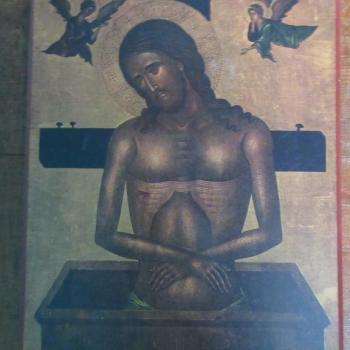That was the Swiss-based news service Ecumenical News International‘s assessment of Pope Benedict’s latest selection of 22 new cardinals, the majority of whom are European, with Italy having the largest single representation. (ENI’s full article does not appear to be available, but the full story can be found here.)
Much as I prefer to differentiate myself from our church’s liberal reactionaries who love to hate the Big Bad Hierarchy’s every move, this worries me a bit. My concerns are twofold, having to do firstly with the tension between Romanitas and catholicity that we Roman Catholics live in by definition, and secondly with perceptions (however debatable their accuracy may be) of how the RC Church is or isn’t balancing this tension between its R and its C.
It’s a paradox that has been much on my mind, especially as the “Roman” part of it was perhaps the biggest hurdle in my meandering journey into the Catholic Church. “I want to be Catholic,” I thought many times, “but could I live with being Roman?” I even wondered at times whether “Roman Catholic” was an oxymoron: if Catholic means universal, does the privileged place given to Romanness contradict the more broadly global nature of the church implied by catholicity? Ironically perhaps, it was only after I had joined this paradox of a church that I came to the uneasy conclusion that its catholicity does indeed have room for some degree of Romanitas (as long, I hasten to add, as it isn’t universalized in ways that marginalize other cultural expressions), and for those with an affinity for it beyond my comfort zone – precisely because catholicity is too big for anyone’s comfort zone.
But enough about me; let’s talk about our Pope. His ecclesiology has seemed at times to be disturbingly Eurocentric, which makes the underrepresentation of non-European cardinals somewhat more disconcerting than it already is in itself, giving some credence to the suggestion that his choices demonstrate a lack of concern for reflecting the catholicity of the worldwide Catholic communion. On the other hand, his perspectives on various other matters are more nuanced than many give him credit for; in view of this, the implication that he is deliberately stacking the deck toward a staunchly conservative successor sounds rather oversimplified. But even if such accusations are exaggerated, it doesn’t help that his selection lends itself to being construed that way. Or would such a construal be inevitable in any case?
All motives aside, the real concern regarding the makeup of the conclave is what this will indeed mean for the future of the church. One thought I find myself wishing I could shake: If our next Pope takes the name Pius XIII, we’ll know we’re in for trouble.












